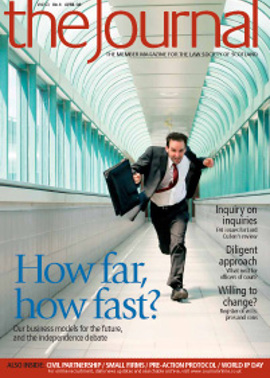Same difference

Fraud
In Canada, it seems there have been several instances of a particular type of identity fraud. The fraudster gets himself registered as the sole unencumbered proprietor of a house belonging to someone else. He then arranges a loan on security of the house. If questions are raised, the fraudster explains that he frequently makes investment property purchases part-financed “retrospectively” in this way. The fraudster disappears with the loan advance, leaving the lender with a worthless security… and a claim against a solicitor?
In New South Wales, commentaries indicate that there are increasing numbers of claims involving identity fraud there.In England & Wales, as here, concerns are being expressed about the exposure of solicitors to claims arising out of mortgage fraud perpetrated by borrowers on lending institutions. The techniques adopted by those involved are apparently little different to those which resulted in a raft of claims in the 1990s. Mortgage fraud risk will be addressed in this year’s Risk Management Roadshow and in future issues of this column.
Economic conditions
In Victoria, the latest newsletter of the Legal Practitioners’ Liability Committee observes that “a cooling economy and falling asset prices… should put all practitioners on alert”. Why?
The newsletter cites past experience of changing economic conditions causing close scrutiny of the terms of documentation – particularly loan documentation, securities, leases, and contracts for property sales – and, in the process, detection of errors or omissions in documentation or in the way the interests of the parties have been protected.
This scrutiny may come about because of default of one of the parties, or because one of the parties is looking for a way out of their contractual commitments. In either event, claims can then arise if it is considered that somehow the parties’ interests have been prejudiced. These situations have included claims at the instance of lenders on the basis that their securities were defective in some way, or that solicitors have otherwise failed to protect the lender’s interests.
Here, in the early 1990s, following a downturn in the property market in the late 1980s, one in every three Master Policy intimations involved a claim by a lender seeking to recover losses following their borrower’s default. Those claims typically involved allegations of:
- inadequate reporting to lenders;
- ineffective, or omitted, ranking provisions in security deeds;
- delayed recording of security deeds.
These claims tended to be costly, and this had an adverse impact on the Master Policy claims experience and premiums. How will any downturn in the Scottish property market now, impact on the experience of lender claims against solicitors over the course of the next few years? What steps can be taken to address the risk?
The Victoria newsletter encourages review of files to ensure that the recording of securities has not been overlooked, and the review of office systems to ensure that securities are always recorded promptly.
Credit crunch hurts
According to the Law Society Journal in New South Wales, the recent claims experience of solicitors there features a number of claims at the instance of elderly relatives who have provided funding, security or guarantees to help younger relatives with house purchases or financing of business ventures. When difficulties arise in servicing the debt, the elderly relatives have been the losers, sometimes losing their homes, and allegations are then made against solicitors with regard to advice provided to them.Could restrictions in bank lending here potentially generate an increase in this description of allegations/claims? The risks involved in family funded property purchases are not unknown to the Master Policy insurers, although the context has so far tended to be the reverse of the New South Wales scenario, most often younger relatives funding the purchase of parents’ or other elder relatives’ council houses.
Risk controls suggested in the New South Wales commentaries include:
- a process of making it clear to the parties involved whose interests the firm is/is not representing;
- when acting for the funder client, insisting on always taking instructions from the client directly and not in the presence of the beneficiaries of the funding;
- being satisfied as regards the client’s capacity, and acting on any concerns as regards capacity;
- considering whether to refer the client to an independent adviser to provide financial advice in relation to the transaction.
Client characteristics
An article in the New South Wales Journal refers to research into claims against solicitors in that jurisdiction, and talks of certain client characteristics that are a feature of “a significant number of claims”. The article refers to “client conduct adverse to the effective handling of the matter” in which the solicitor is acting for the client.
The clients referred to are characterised as including clients who:
- are indecisive about their objectives or about accepting advice given, or change instructions frequently;
- use allegations of negligence to avoid/defer payment of fees;
- accept a settlement recommendation but later allege they shouldn’t have been advised to accept;
- following a breakdown in close family relationships, allege that some arrangement which their solicitor has advised on favours one part of the family at the expense of others;
- insist that they are content to leave all decision making to their solicitor, but later make accusations of a wrong decision or inappropriate advice;
- persistently fail to respond to letters and later make a claim on the basis that their interests have been prejudiced by inaction, delay or a missed time limit.
These client characteristics are no less a feature of practice here, and are undoubtedly a factor in the experience of complaints and claims too. What can be done to address the risks these characteristics present? The New South Wales article makes reference to:
- recognising the potentially challenging client characteristics and the potential risks they present;
- ensuring that colleagues have the required awareness of these risk factors and of the appropriate responses, including necessary “soft skills”;
- deciding whether the client is someone the firm really wishes to act for;
- making it clear to the client, and documenting, matters for which the firm is not to be responsible as part of the engagement;
- documenting changes to the scope of the engagement;
- confirming advice in writing;
- making detailed file notes of meetings and telephone conversations.
Here, in the context of the Scottish Legal Complaints Commission, solicitors have made reference to these same issues and spoken of tightening up on vetting and engagement of clients as part of their approach to address the risk of complaints to the Commission.
Indemnity provisions
Another New South Wales Journal article observes that it is becoming increasingly common for law firms of all sizes to get involved in tenders for the provision of legal services. The process will typically require solicitors to commit to standard terms and conditions including indemnity and insurance obligations.
Sometimes these obligations are particularly onerous, and may conflict to some extent with the cover solicitors have under their professional indemnity insurance. Increasingly, there are contractual provisions to which solicitors are being required to commit, which raise risk management and insurance issues that have been addressed in previous columns (Rona Paterson, “In real terms”, Journal, December 2005, 38).
Cheque fraud
Earlier this year, providers of professional indemnity insurance cover for lawyers in Canada issued an alert, warning the profession there of a scam involving counterfeit certified cheques. These cheques, in respect of loans to fund commercial transactions, were being relied on by practitioners who then issued client account cheques in settling the transaction. By the time the lawyer is advised that the certified cheque is bogus, it is too late and there is a shortfall on the client account.
This particular scam has not been a feature of the claims experience here, but other issues involving both client account and firm account cheques have featured in recent intimations – cheques being misappropriated and presented for payment with payee (and other) details altered, for example.
Equity release
In Australia and Canada insurers have issued warnings to solicitors about the dangers associated with advising on equity release arrangements.
The combination of value and complexity, together with the fact that equity release is a form of borrowing most popular with elderly clients, and the possibility of any future downturn in the housing market bringing a return of negative equity which might leave equity release borrowers exposed, are all factors that have led PII insurers to flag up such schemes with solicitors as a serious risk issue which should be treated with caution.
The market for equity release is less developed in the UK but predicted to grow. In England & Wales insurers have raised concerns about the risk of claims against solicitors, and some require disclosure of information about the extent of involvement in providing advice on these arrangements as part of the professional indemnity insurance renewal process. This column in November 2006 and August 2007 commented on the risks associated with advising on equity release arrangements.
Acting as a director
In a recent article, lawyers in Canada were reminded that being a director of a client company is not without its risks and encouraged to consider the issues before accepting an invitation to join the board – more particularly the potential for conflicts of interest, the ever-increasing range of potential liabilities of company directors, and the heightened expectations in respect of good governance.
The article observes:
- that it is the policy of many larger law firms in that jurisdiction that their lawyers will not take on directorships (with the possible exception of directorships of certain non-profit-making charitable organisations);
- that the growing trend is for lawyers to decline invitations to become a director of a client company;
- that, as is the case here, the firm’s professional indemnity insurance does not provide cover for liabilities arising from a lawyer’s actions as a director.
Risk, risk management and insurance issues for solicitor-directors were addressed in this column in “The directing mind” (July 2005, 36).
ALISTAIR SIM AND MARSH
Alistair Sim is a former solicitor in private practice who works in the FinPro (Financial and Professional Risks) National Practice at Marsh, the world’s leading risk and insurance services firm. To contact Alistair, email: alistair.j.sim@marsh.com .
The information contained in this article provides only a general overview of subjects covered, is not intended to be taken as advice regarding any individual situation and should not be relied upon as such. Insureds should consult their insurance and legal advisers regarding specific coverage issues.
Marsh Ltd is authorised and regulated by the Financial Services Authority.
In this issue
- Thinking ahead
- A line too often crossed
- Big leap forward
- Independence: still viable?
- FAIs: a new lease of life
- ARTL: Turquoise is in the pink
- Summary trials: deciding the facts
- Life at the sharp end
- Conscience and public service
- Wills and ways
- Achieving "senior" rates?
- CPD: the way forward
- Life on the edge
- Pre-action protocol for industrial disease claims
- Fit a doin'?
- Same difference
- Curiosity corner
- System? What system?
- Reviewing appeals
- Testing insolvency
- Scottish Solicitors' Discipline Tribunal
- Website reviews
- Book reviews
- Day of creation
- Lawyer behind the camera
- Homing in on home reports






